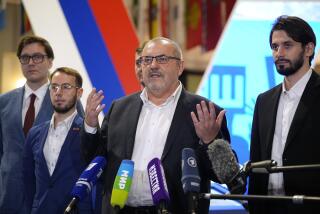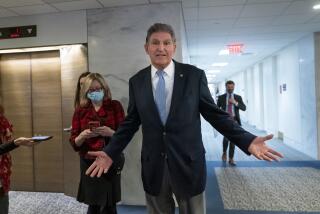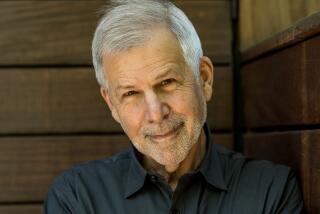Russian Party Formed for White-Collar Workers and Entrepreneurs : Politics: The new group lacks big names, although Moscow’s mayor offers words of support.
- Share via
MOSCOW — At a Moscow theater more accustomed to celluloid romance than the tumult of politics, scores of delegates from throughout Russia met Tuesday to launch a party defending the long-neglected interests of the country’s white-collar workers and entrepreneurs.
But the Russian Party of Democratic Transformations began life with several hobbling handicaps. Although it springs from a national pro-reform movement launched by Eduard A. Shevardnadze, Alexander N. Yakovlev and other major Soviet political personalities, they made it clear they want nothing to do for now with the party itself.
Also, Russian Federation President Boris N. Yeltsin and his allies have been standoffish toward a group that could be a potential competitor at the ballot box, meaning that the new party cannot count on the support of Russia’s single most influential figure.
About the only “name” politician the new party could lure to its founding congress at the Moscow Cinema Center was Gavriil K. Popov, the mayor of Moscow, who offered words of support for the fledgling organization but did not stick around to join it.
Popov told the more than 100 delegates that there is a need for a “more precise, more effective” alliance of the often-disorganized Soviet intelligentsia’s political forces.
Popov admitted that the Soviet Communist Party had given all political parties a bad name. But, he noted, there are other types of political parties.
When he was recently in Chicago, the Moscow mayor said, he was surprised to find that the Democratic Party’s city committee had only two full-time employees. In any Moscow neighborhood, the Communists used to have enough full-time employees to fill a large building.
“We need simple political clubs where we can meet with friends,” said Popov, who quit the Communist Party along with many other progressive and radical politicians last year. “The times of those parties with many millions of members that one had to join to be able to make a career have passed.”
Popov said he could see two basic political tendencies in the Soviet Union--a “social democratic trend” such as that of the Socialist parties of Western Europe, and a trend in support of the country’s budding entrepreneurial class. He strongly suggested that the Russian Party of Democratic Transformations should become the latter, representing office workers, independent businessmen and others who earn their living with their brains.
The new party is an offshoot of the Democratic Reform Movement founded by a group of well-known progressives including Shevardnadze and Yakovlev, both of whom were once close allies of Soviet President Mikhail S. Gorbachev.
A Moscow conference of the movement, held at the cinema center the previous day, found three-quarters of the participants in favor of a “radical” transition to a market economy and a loose, rather than federal, association of the republics of the Soviet Union.
The movement, like the party it spawned, is resoundingly middle-class in the Soviet context. A poll of the conference’s participants showed that almost three-quarters of those attending from Moscow classified themselves as “members of the intelligentsia.”
The party’s draft theses echo principles of classical liberalism by calling for the separation of powers and the primacy of individual human rights. The new party will also seek a “civilized market” and the restoration of the right to freely buy and sell land.
To exercise any influence, however, party members will have to win elective office, and its founders acknowledged that will pose a problem.
The Party of Democratic Transformations, which joins a list of at least 25 other parties and movements, for the moment does not have a well-known leader who could galvanize the electorate, said Moscow deputy Alexander P. Braginsky, one of the founders.
“People join parties not because of some political ideas or concepts but because they support them exclusively on the basis of their faith in a particular leader or political figure,” Braginsky said. “People unite around leaders, not ideas.”
Braginsky said his party might endorse candidates fielded by other parties when it could field none of its own.
Within hours of the close of the constituent assembly attended by delegates from Moscow, Leningrad, the Urals, Siberia, the Black Sea region and the Soviet Far East, more than 600 people applied for membership in the new party, the Soviet news agency Tass reported.
Gorbachev’s new press secretary, Andrei S. Grachev, told his first news briefing that Gorbachev was in regular contact with the leaders of the Democratic Reform Movement and that one of its founders, Yakovlev, had agreed again to become a presidential adviser.
More to Read
Sign up for Essential California
The most important California stories and recommendations in your inbox every morning.
You may occasionally receive promotional content from the Los Angeles Times.










